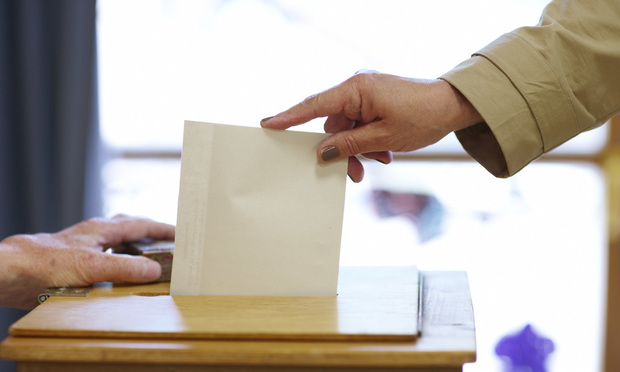To Bind or Not To Bind?
National Popular Vote is not a good idea. It is far from being adopted by the necessary states with a majority of elector votes. It is unlikely ever to reach that goal.
June 03, 2020 at 10:00 AM
3 minute read
 Photo: Christian Schwier/Fotolia
Photo: Christian Schwier/Fotolia
New York is one of some 20 states that does not by state statute bind its electors to vote for the presidential candidate who wins the states popular vote (There is a lower court case some 90 years ago of dubious authority that is relevant to this issue.). New York's presidential electors are, therefore, free, as a matter of state law, to vote for anyone. As Justice Robert H. Jackson famously observed in his dissent in Ray v. Blair, 343 U.S. 214 (1952), this is exactly what Framers intended. Ray itself is the only Supreme Court case ever to deal with this issue, and Justice Reed's opinion leaves the question of binding up to a political party mechanism.
The Supreme Court heard arguments on May 12. The case from a Colorado federal circuit court in scholarly and thoughtful opinion held that a Colorado state law binding them was unconstitutional. In the case from the Washington State Supreme Court, the court sustained a state law penalty on an elector who did not vote for the candidate who won the state's popular vote.
Without waiting for the Supreme Court's decision, State Senators Skoufis and Myrie have introduced Senate 6886 that would make New York a statutory elector binding state. As yet, there is no Assembly counterpart bill. If enacted, this bill would take effect immediately, but would sunset prior to the 2024 presidential election.
The bill seemingly ignores the fact that New York is a member of the National Popular Vote movement. National Popular Vote purports to require member states to bind their electors to vote for the national popular vote winner regardless of who won the popular vote in their respective states. Governor Cuomo first vetoed a bill making New York a member. Later he signed another one.
For all of the reasons in my prior NYLJ commentary (see 17 Reasons Why the National Popular Vote Initiative Is Likely To Fail (Jan. 4, 2019)), National Popular Vote is not a good idea. It is far from being adopted by the necessary states with a majority of elector votes. It is unlikely ever to reach that goal. In fact, six of the states that have adopted National Popular Vote have moved to repeal its adoption, and three states have enacted legislation prohibiting adoption. Moreover, New York has never adopted the legislation required by federal law to implement its membership in National Popular Vote.
The Senate bill is obviously inconsistent with New York's National Popular Vote membership, and except for a generalized "Notwithstanding" clause, ignores New York's national popular vote membership.
Finally, if Supreme Court affirms the Colorado decision, the state binding laws of some 30 states would become unconstitutional.
William Josephson is a retired partner from Fried, Frank, Harris, Shriver & Jacobson.
This content has been archived. It is available through our partners, LexisNexis® and Bloomberg Law.
To view this content, please continue to their sites.
Not a Lexis Subscriber?
Subscribe Now
Not a Bloomberg Law Subscriber?
Subscribe Now
NOT FOR REPRINT
© 2025 ALM Global, LLC, All Rights Reserved. Request academic re-use from www.copyright.com. All other uses, submit a request to [email protected]. For more information visit Asset & Logo Licensing.
You Might Like
View All
‘Catholic Charities v. Wisconsin Labor and Industry Review Commission’: Another Consequence of 'Hobby Lobby'?
8 minute read
AI and Social Media Fakes: Are You Protecting Your Brand?

Neighboring States Have Either Passed or Proposed Climate Superfund Laws—Is Pennsylvania Next?
7 minute read
Law Firms Mentioned
Trending Stories
Who Got The Work
J. Brugh Lower of Gibbons has entered an appearance for industrial equipment supplier Devco Corporation in a pending trademark infringement lawsuit. The suit, accusing the defendant of selling knock-off Graco products, was filed Dec. 18 in New Jersey District Court by Rivkin Radler on behalf of Graco Inc. and Graco Minnesota. The case, assigned to U.S. District Judge Zahid N. Quraishi, is 3:24-cv-11294, Graco Inc. et al v. Devco Corporation.
Who Got The Work
Rebecca Maller-Stein and Kent A. Yalowitz of Arnold & Porter Kaye Scholer have entered their appearances for Hanaco Venture Capital and its executives, Lior Prosor and David Frankel, in a pending securities lawsuit. The action, filed on Dec. 24 in New York Southern District Court by Zell, Aron & Co. on behalf of Goldeneye Advisors, accuses the defendants of negligently and fraudulently managing the plaintiff's $1 million investment. The case, assigned to U.S. District Judge Vernon S. Broderick, is 1:24-cv-09918, Goldeneye Advisors, LLC v. Hanaco Venture Capital, Ltd. et al.
Who Got The Work
Attorneys from A&O Shearman has stepped in as defense counsel for Toronto-Dominion Bank and other defendants in a pending securities class action. The suit, filed Dec. 11 in New York Southern District Court by Bleichmar Fonti & Auld, accuses the defendants of concealing the bank's 'pervasive' deficiencies in regards to its compliance with the Bank Secrecy Act and the quality of its anti-money laundering controls. The case, assigned to U.S. District Judge Arun Subramanian, is 1:24-cv-09445, Gonzalez v. The Toronto-Dominion Bank et al.
Who Got The Work
Crown Castle International, a Pennsylvania company providing shared communications infrastructure, has turned to Luke D. Wolf of Gordon Rees Scully Mansukhani to fend off a pending breach-of-contract lawsuit. The court action, filed Nov. 25 in Michigan Eastern District Court by Hooper Hathaway PC on behalf of The Town Residences LLC, accuses Crown Castle of failing to transfer approximately $30,000 in utility payments from T-Mobile in breach of a roof-top lease and assignment agreement. The case, assigned to U.S. District Judge Susan K. Declercq, is 2:24-cv-13131, The Town Residences LLC v. T-Mobile US, Inc. et al.
Who Got The Work
Wilfred P. Coronato and Daniel M. Schwartz of McCarter & English have stepped in as defense counsel to Electrolux Home Products Inc. in a pending product liability lawsuit. The court action, filed Nov. 26 in New York Eastern District Court by Poulos Lopiccolo PC and Nagel Rice LLP on behalf of David Stern, alleges that the defendant's refrigerators’ drawers and shelving repeatedly break and fall apart within months after purchase. The case, assigned to U.S. District Judge Joan M. Azrack, is 2:24-cv-08204, Stern v. Electrolux Home Products, Inc.
Featured Firms
Law Offices of Gary Martin Hays & Associates, P.C.
(470) 294-1674
Law Offices of Mark E. Salomone
(857) 444-6468
Smith & Hassler
(713) 739-1250






